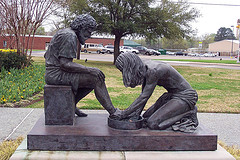I realized today (actually it’s more of an emergent process than that, but today put the words on it) that within the next 10 months or so, I need to make an important decision which, although I can adjust as I go, will in all likelihood substantially bias my work for a good chunk of my life: Am I am big R or little r sociologist of religion?
Anyone who knows me can attest to my hesitancy and unwillingness to make this kind of decision; that’s why I have 4 degrees and am only now starting my PhD program and heading for two more. So what do I mean by big and little R?
A little r sociologist of religion concerns him or herself with the gradual accumulation of knowledge, the successive testing of aspects of theory using whatever data and methods are available to them. Most work in the field is of this sort, and much of it is very high quality and useful. The type of articles and books I review on my companion blog sociofaithful fall into this and can be very valuable both to people interested in the functioning of society and churches and to people with a practical interest in ministry. It is easy to collaborate with others, contribute to the growth of the discipline, and publish frequent and (hopefully) meaningful articles using this approach.
A big R sociologist of Religion, on the other hand, is as much a philosopher as a consumer of data. They are more concerned with the development of theory explaining broader phenomena and working across cultures than with the functioning of a specific cultural manifestation of religion, except insofar as it reflects larger concepts in the theory of religion. If dataheads are the pastors of the sociological academy, theorists are more like systematic theologians, trying to synthesize as much as possible to understand in broad strokes both (current and historical) reality and the sea changes that take place from time to time.
Neither approach disregards the other. Big R sociology without data is just speculation and pontification. Little r sociology without theory is devoid of content and falls closer to journalism (i.e. reporting) than knowledge creation. I love both. I can’t get enough good data to satisfy me, because it is the only way to see what’s really going on. But I can’t help but ask bigger questions than survey data analysis can answer. In the end, I will end up as either a theoretically aware quantitative dude or a statistically knowledgeable theory guy, but the two are still worlds apart.
And even though I am nearly 5 years away from the terminus of my program, the decisions start now, because there is not time to study numbers, ideas, languages, and the history of the discipline all to a level of mastery. If I spend my time studying social thought, I have less time to understand the inner workings of the statistics that are the bread and butter of sociological scholarship today. If I care enough about Japan to refresh and improve my skills in the language, what other opportunities am I missing out on? And while there is much of my life yet, Robert Frost touched reality closely in his famous poem of choosing a path:
[I] Then took the other, as just as fair, And having perhaps the better claim, Because it was grassy and wanted wear; Though as for that the passing there Had worn them really about the same,
Even more than that, I will be adjusting to the habit of producing certain kinds of knowledge whose processes are very different. Certainly at Penn State the natural choice would seem to be the little r; our faculty is among the best in the world at thoughtful, relevant, incremental knowledge production. But who am I? Because I am both, but the two identities are held in tension and not allowing one to grow beyond the other would stymie my ability to participate in ongoing conversations and be useful in creating new ones.
And it goes beyond personal identity to personal vocation and theology. Clearly, I have the ability to produce multiple things. My M.A. thesis is an abstract theological proposal; my undergraduate thesis is evaluative number crunching. But I have to ask, what is the role I have been given in the scheme of God’s unfolding design of creation: a (hopefully masterful) craftsman or an intellectual? In what way am I embodying my Jesus, my God in my world? In the end, the decision returns to the missional question, not in a utilitarian way that seeks to maximize some underlying value that can be quantified and tested against others, but in a contextual way that seeks to answer “What am I doing here now?” I appreciate your shared prayers and I would love to offer mine to yours also. Vocation is one of the deepest, most personal, most meaningful and contextual (and thus frustrating and exhilarating to figure out) aspects of a life of faith. Peace to you in your own call.



 With a title like this, you might think: “Nate’s gone off his rocker. All this rapture talk has turned him into a conspiracy theorist.” Judge for yourself, but I think you will find a compelling case below that we as the church, like the internet, are in danger of over-personalizing our user experience to the extent that we lose sight of both the gospel and the missio dei.
With a title like this, you might think: “Nate’s gone off his rocker. All this rapture talk has turned him into a conspiracy theorist.” Judge for yourself, but I think you will find a compelling case below that we as the church, like the internet, are in danger of over-personalizing our user experience to the extent that we lose sight of both the gospel and the missio dei.
